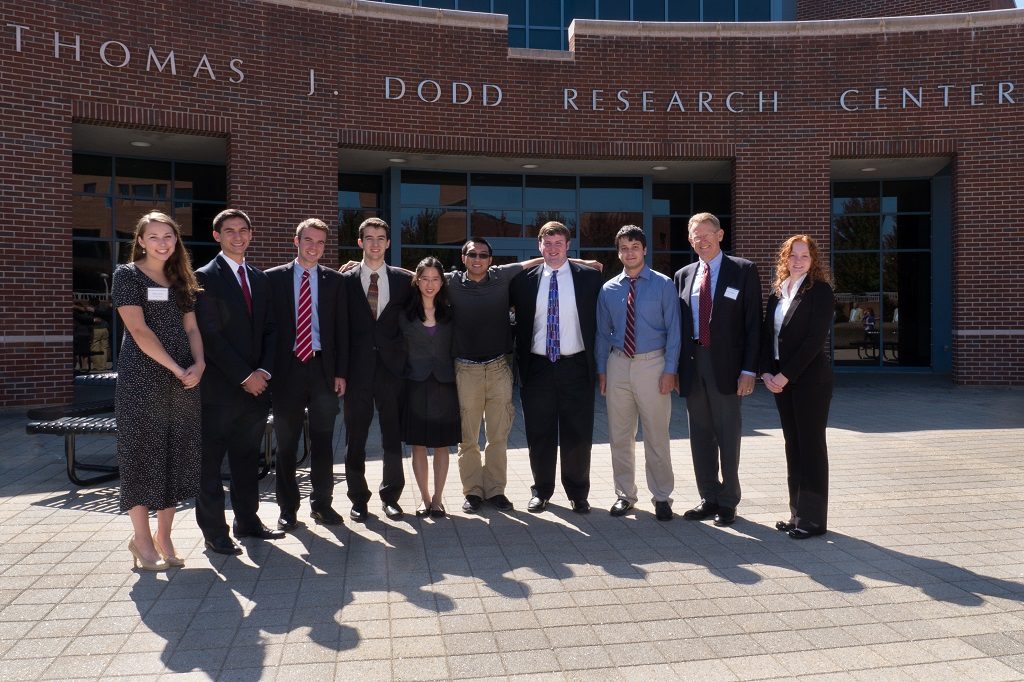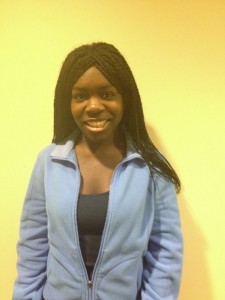
Marissa Piccolo, from Trumbull, CT, is a political science and economics major with a minor in history. She is also a SHARE Awardee with Dr. Prakash Kashwan (Political Science), researching the role of NGOs in international environmental governance and policy. In addition, she is a staff writer for the Daily Campus, an Ex-officio Senator representing the Honors Council in USG, and President of the UConn College Democrats.
Project: “Redefining the Role of Public High Schools and Community Mental Health: An Exploration of Mental Health Care Access in the PBIS Framework”
Faculty mentor: Dr. Jennifer Freeman (Department of Educational Psychology)
Brian Liang, from Bethany, CT, is a pre-med molecular and cell biology major who has been a regular volunteer at Yale New Haven Hospital. In high school, he participated in numerous research projects. Among many accolades for his work, he won first place for his poster presentation at the CT Junior Science and Humanities Symposium, held at UConn in 2013. In addition, before college he was consistently a top-16 ranked swimmer in the state of Connecticut.
Project: “Analysis of the anti-adhesion mechanism in ovarian cancer cells”
Faculty Mentor: Dr. Xiuling Lu (Department of Pharmaceutical Science)
Sarah Mosure, from Cromwell, CT, is a pre-med biological sciences major. In addition to her work in the Sun Lab, which she began in September 2013, she is a member of the UConn’s Division I Varsity Women’s Rowing Team and an active member of Arm 2 Arm, an organization which provides medical care to Haiti.
Project: “The Effect of Adipose Secretions on Fertility and Ovulation”
Faculty Mentor: Dr. Jianjun Sun (Department of Physiology and Neurobiology)
Patrick Adams, from Wethersfield, CT, is an economics major (with an intended double major in mathematics). He is also the recipient of a SHARE Award with Dr. Talia Bar (Economics), examining patent application systems. In addition, Pat is an accomplished jazz musician.
Project: “Iterated Two-Sided Matching”
Faculty Mentor: Dr. Victoria Knoblauch (Department of Economics)
John Ovian, from Madison, CT, is a chemistry major and research assistant in the Leadbeater Lab, interested in new synthetic (“green”) chemistry. A singer and vocal instructor in high school, he is also Director of Extreme Measures, a co-ed a cappella group at UConn.
Project: “Oxoammonium Salts as a Tool to Access New Chemicals from Biorenewable Feedstocks”
Faculty Mentor: Dr. Nicholas Leadbeater (Department of Chemistry)
Joseph DeSisto, from Orono, ME, has already been identified as one of the leading myriapod experts in New England, having studied “creepy- crawly things” throughout his youth and having worked as field assistant for researchers at the University of Maine. He is currently developing an identification guide to centipedes of New England.
Project: “The Centipedes of Great Smokey Mountains National Park”
Faculty Mentor: Dr. Jane O’Donnell, Scientific Collection Manager (Department of Ecology & Evolutionary Biology)
Isabel Nip, from West Hartford, CT, is a pre-med biological sciences major who began conducting research at UConn in the summer of 2012 through the UConn Mentor Connection for Talented Youth program. She is also an accomplished pianist and a volunteer at UConn’s John Dempsey Hospital and for the Hartford Rescue Mission.
Project: “Exploring the Role of the Cytoskeleton in Neurodegenerative Diseases”
Faculty Mentor: Dr. Kenneth Campellone (Department of Molecular and Cell Biology)
Adam Kuegler, from Watertown, CT, is a political science major with an interest in law and politics, having served on state and national campaigns. A runner and 2013 Valedictorian of his high school, he was selected as the Republican-American Top Male Scholar Athlete of 2012.
Project: “The Heart of the Democratic Struggle: The Voter ID Debate”
Faculty Mentor: Dr. Thomas Hayes (Department of Political Science)
Andrew Harnedy, from Guilford, CT, is majoring in classics and ancient Mediterranean studies. In addition to his passion for classics and history, he is a performer and author of The Second Impeachment of Andrew Johnson, a historical novel.
Project: “Whose Victory? A Debate for the Ages”
Faculty Mentor: Dr. Daniel Caner (Department of History)

